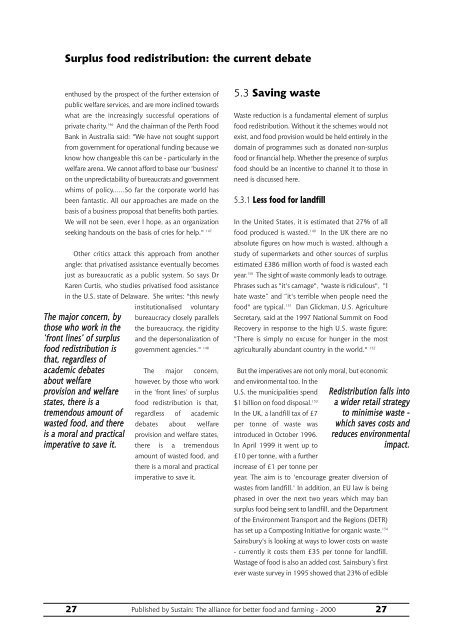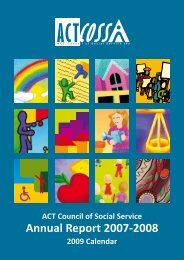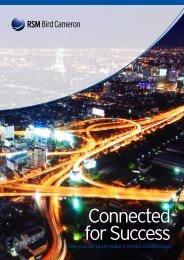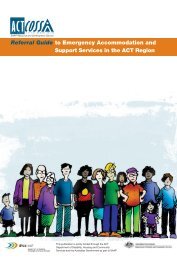Too much and too little? Debates on surplus food redistribution
Too much and too little? Debates on surplus food redistribution
Too much and too little? Debates on surplus food redistribution
Create successful ePaper yourself
Turn your PDF publications into a flip-book with our unique Google optimized e-Paper software.
Surplus <strong>food</strong> redistributi<strong>on</strong>: the current debate<br />
enthused by the prospect of the further extensi<strong>on</strong> of<br />
public welfare services, <str<strong>on</strong>g>and</str<strong>on</strong>g> are more inclined towards<br />
what are the increasingly successful operati<strong>on</strong>s of<br />
private charity. 146 And the chairman of the Perth Food<br />
Bank in Australia said: "We have not sought support<br />
from government for operati<strong>on</strong>al funding because we<br />
know how changeable this can be - particularly in the<br />
welfare arena. We cannot afford to base our 'business'<br />
<strong>on</strong> the unpredictability of bureaucrats <str<strong>on</strong>g>and</str<strong>on</strong>g> government<br />
whims of policy......So far the corporate world has<br />
been fantastic. All our approaches are made <strong>on</strong> the<br />
basis of a business proposal that benefits both parties.<br />
We will not be seen, ever I hope, as an organizati<strong>on</strong><br />
seeking h<str<strong>on</strong>g>and</str<strong>on</strong>g>outs <strong>on</strong> the basis of cries for help." 147<br />
Other critics attack this approach from another<br />
angle: that privatised assistance eventually becomes<br />
just as bureaucratic as a public system. So says Dr<br />
Karen Curtis, who studies privatised <strong>food</strong> assistance<br />
in the U.S. state of Delaware. She writes: "this newly<br />
instituti<strong>on</strong>alised voluntary<br />
bureaucracy closely parallels<br />
the bureaucracy, the rigidity<br />
<str<strong>on</strong>g>and</str<strong>on</strong>g> the depers<strong>on</strong>alizati<strong>on</strong> of<br />
government agencies." 148<br />
TThhee mmaajjoorr cco<strong>on</strong>ncceerrnn,, bbyy<br />
tthhoossee wwhhoo wwoorrkk iinn tthhee<br />
‘‘ffrro<strong>on</strong>ntt lliinneess’’ ooff ssuurrpplluuss<br />
ffoooodd rreeddiissttrriibbuuttiio<strong>on</strong>n iiss<br />
tthhaatt,, rreeggaarrddlleessss ooff<br />
aaccaaddeemmiicc ddeebbaatteess<br />
aabboouutt wweellffaarree<br />
pprroovviissiio<strong>on</strong>n aanndd wweellffaarree<br />
ssttaatteess,, tthheerree iiss aa<br />
ttrreemmeennddoouuss aammoouunntt ooff<br />
wwaasstteedd ffoooodd,, aanndd tthheerree<br />
iiss aa mmoorraall aanndd pprraaccttiiccaall<br />
iimmppeerraattiivvee t<str<strong>on</strong>g>too</str<strong>on</strong>g> ssaavvee iitt..<br />
27<br />
The major c<strong>on</strong>cern,<br />
however, by those who work<br />
in the ‘fr<strong>on</strong>t lines’ of <strong>surplus</strong><br />
<strong>food</strong> redistributi<strong>on</strong> is that,<br />
regardless of academic<br />
debates about welfare<br />
provisi<strong>on</strong> <str<strong>on</strong>g>and</str<strong>on</strong>g> welfare states,<br />
there is a tremendous<br />
amount of wasted <strong>food</strong>, <str<strong>on</strong>g>and</str<strong>on</strong>g><br />
there is a moral <str<strong>on</strong>g>and</str<strong>on</strong>g> practical<br />
imperative to save it.<br />
5.3 Saving waste<br />
Waste reducti<strong>on</strong> is a fundamental element of <strong>surplus</strong><br />
<strong>food</strong> redistributi<strong>on</strong>. Without it the schemes would not<br />
exist, <str<strong>on</strong>g>and</str<strong>on</strong>g> <strong>food</strong> provisi<strong>on</strong> would be held entirely in the<br />
domain of programmes such as d<strong>on</strong>ated n<strong>on</strong>-<strong>surplus</strong><br />
<strong>food</strong> or financial help. Whether the presence of <strong>surplus</strong><br />
<strong>food</strong> should be an incentive to channel it to those in<br />
need is discussed here.<br />
5.3.1 Less <strong>food</strong> for l<str<strong>on</strong>g>and</str<strong>on</strong>g>fill<br />
In the United States, it is estimated that 27% of all<br />
<strong>food</strong> produced is wasted. 149 In the UK there are no<br />
absolute figures <strong>on</strong> how <str<strong>on</strong>g>much</str<strong>on</strong>g> is wasted, although a<br />
study of supermarkets <str<strong>on</strong>g>and</str<strong>on</strong>g> other sources of <strong>surplus</strong><br />
estimated £386 milli<strong>on</strong> worth of <strong>food</strong> is wasted each<br />
year. 150 The sight of waste comm<strong>on</strong>ly leads to outrage.<br />
Phrases such as "it's carnage", "waste is ridiculous", "I<br />
hate waste” <str<strong>on</strong>g>and</str<strong>on</strong>g> “it's terrible when people need the<br />
<strong>food</strong>" are typical. 151 Dan Glickman, U.S. Agriculture<br />
Secretary, said at the 1997 Nati<strong>on</strong>al Summit <strong>on</strong> Food<br />
Recovery in resp<strong>on</strong>se to the high U.S. waste figure:<br />
"There is simply no excuse for hunger in the most<br />
agriculturally abundant country in the world." 152<br />
But the imperatives are not <strong>on</strong>ly moral, but ec<strong>on</strong>omic<br />
<str<strong>on</strong>g>and</str<strong>on</strong>g> envir<strong>on</strong>mental <str<strong>on</strong>g>too</str<strong>on</strong>g>. In the<br />
U.S. the municipalities spend<br />
$1 billi<strong>on</strong> <strong>on</strong> <strong>food</strong> disposal. 153<br />
In the UK, a l<str<strong>on</strong>g>and</str<strong>on</strong>g>fill tax of £7<br />
per t<strong>on</strong>ne of waste was<br />
introduced in October 1996.<br />
In April 1999 it went up to<br />
£10 per t<strong>on</strong>ne, with a further<br />
increase of £1 per t<strong>on</strong>ne per<br />
year. The aim is to 'encourage greater diversi<strong>on</strong> of<br />
wastes from l<str<strong>on</strong>g>and</str<strong>on</strong>g>fill.' In additi<strong>on</strong>, an EU law is being<br />
phased in over the next two years which may ban<br />
<strong>surplus</strong> <strong>food</strong> being sent to l<str<strong>on</strong>g>and</str<strong>on</strong>g>fill, <str<strong>on</strong>g>and</str<strong>on</strong>g> the Department<br />
of the Envir<strong>on</strong>ment Transport <str<strong>on</strong>g>and</str<strong>on</strong>g> the Regi<strong>on</strong>s (DETR)<br />
has set up a Composting Initiative for organic waste. 154<br />
Sainsbury's is looking at ways to lower costs <strong>on</strong> waste<br />
- currently it costs them £35 per t<strong>on</strong>ne for l<str<strong>on</strong>g>and</str<strong>on</strong>g>fill.<br />
Wastage of <strong>food</strong> is also an added cost. Sainsbury’s first<br />
ever waste survey in 1995 showed that 23% of edible<br />
RReeddiissttrriibbuuttiio<strong>on</strong>n ffaallllss iinnt<str<strong>on</strong>g>too</str<strong>on</strong>g><br />
aa wwiiddeerr rreettaaiill ssttrraatteeggyy<br />
t<str<strong>on</strong>g>too</str<strong>on</strong>g> mmiinniimmiissee wwaassttee -wwhhiicchh<br />
ssaavveess ccoossttss aanndd<br />
rreedduucceess eennvviirro<strong>on</strong>nmmeennttaall<br />
iimmppaacctt..<br />
Published by Sustain: The alliance for better <strong>food</strong> <str<strong>on</strong>g>and</str<strong>on</strong>g> farming - 2000 27













